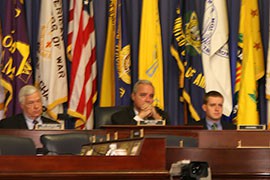Cronkite News has moved to a new home at cronkitenews.azpbs.org. Use this site to search archives from 2011 to May 2015. You can search the new site for current stories.
VA grilled over millions in bonuses to executives at troubled agency
WASHINGTON – House members demanded to know Friday how the Department of Veterans Affairs was able to award millions of dollars in performance bonuses to agency executives at a time of dysfunctional health care at the department.
The bonuses amounted to tens of thousands of dollars for some executives and totaled, by the VA’s own estimates, $2.8 million in 2013 alone, said Rep. Jeff Miller, R-Fla., chairman of the House Veterans Affairs Committee that held the hearing.
Performance awards were also given to officials at the agency’s operations in Phoenix, where health care delays have been implicated in the deaths of some vets.
“It should not be the practice of any federal agency to issue taxpayers’ dollars in addition to paying six-figure salaries to failing senior managers,” Miller said.
He cited numerous cities where officials were rewarded, noting that bonuses went out to 65 percent of the senior executives at the VA.
“Unfortunately, I could go on and on,” Miller said.
The only witness at the hearing was Gina Farrisee, an assistant VA secretary for human resources and administration. She said that while there have been problems, the department needs tools like pay incentives in order to compete in “tough labor markets for skilled personnel.”
“VA recognizes that we face many challenges with performance management and we have much work to do,” Farrisee said in her prepared remarks. “The key here is rigorous and precise implementation and management of all performance plans, whether for senior executives or general-schedule employees.”
But committee members were concerned about the amount of self-assessment by executives that counted toward performances awards, and asked Farrisee why the bar is set “that low” for the metrics that decide bonuses.
It’s “mind-numbing” how low that bar is, said Rep. Jon Runyan, R-N.J. That was echoed by Rep. Ann Kuster, D-N.H., who said that more than 80 percent of executives were graded as above average or outstanding.
“I’m feeling like we are experiencing, what they would call in the academic world, grade inflation,” Kuster said, or “all of the children are above average.”
Farrisee said the VA’s ratings use the five criteria detailed by the Office of Personnel Management for evaluating executives, but that the VA gives special emphasis to the “results driven” measures.
“VA is uniform in evaluating employees,” who can be rated from minimally satisfactory to outstanding, she said.
But Miller said cash awards “are seen as an entitlement,” instead of a reward. Executives are “there to serve veterans,” not collect bonuses to serve themselves, he said.
Miller pointed to Phoenix, where he said VA Medical Center Director Sharon Helman got an $8,500 bonus in February that was later called an “administrative error” – but only after “we questioned the award.”
Problems at the Phoenix VA facilities – including extraordinary delays in care and allegations that workers kept doctored sets of records to make their performance look better than it is – sparked a nationwide audit of VA facilities. The resulting inspector general’s report, completed earlier this month, found systemic problems at facilities nationwide and led to the resignation of then-Secretary Eric Shinseki on May 30.
But this “runs far deeper than just Phoenix,” Miller said, pointing to VA directors in Atlanta, Texas and Ohio who got bonuses despite problems in their facilities.
Rep. Ann Kirkpatrick, D-Ariz., was not at Friday’s hearing but entered a letter into the hearing record that “because this system of awarding bonuses to employees is easily subject to manipulation, the VA needs to look at other ways to recruit and retain talent.”
Miller opened the hearing by noting that while it took longer than he had hoped for the agency to produce documents from October 2013, “their (VA) production of the requested material is sufficient” and the committee would not need to issue subpoenas as it had threatened.
But he did not let the agency off the hook. The idea that VA employees “are motivated by financial incentives alone,” leads to huge “mistrust,” he said.







